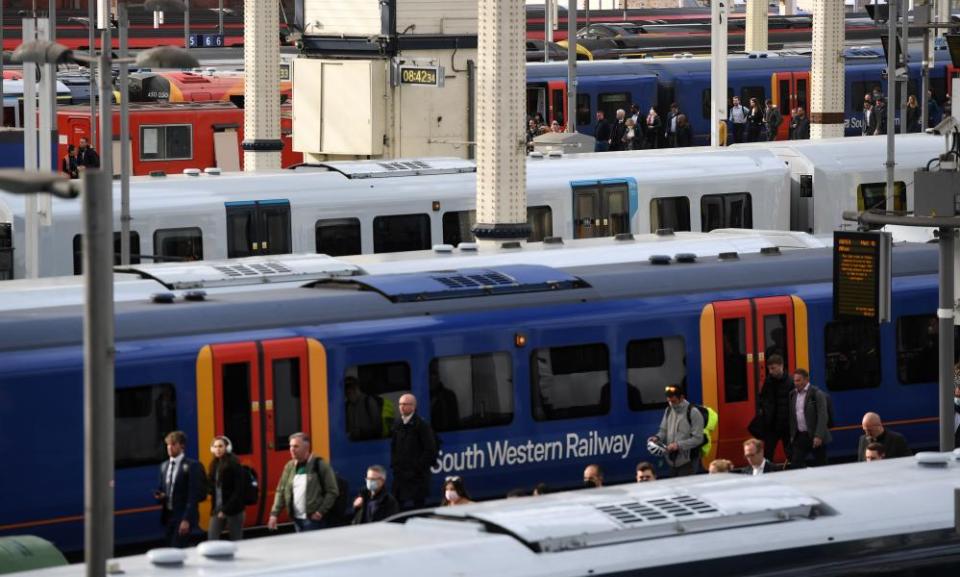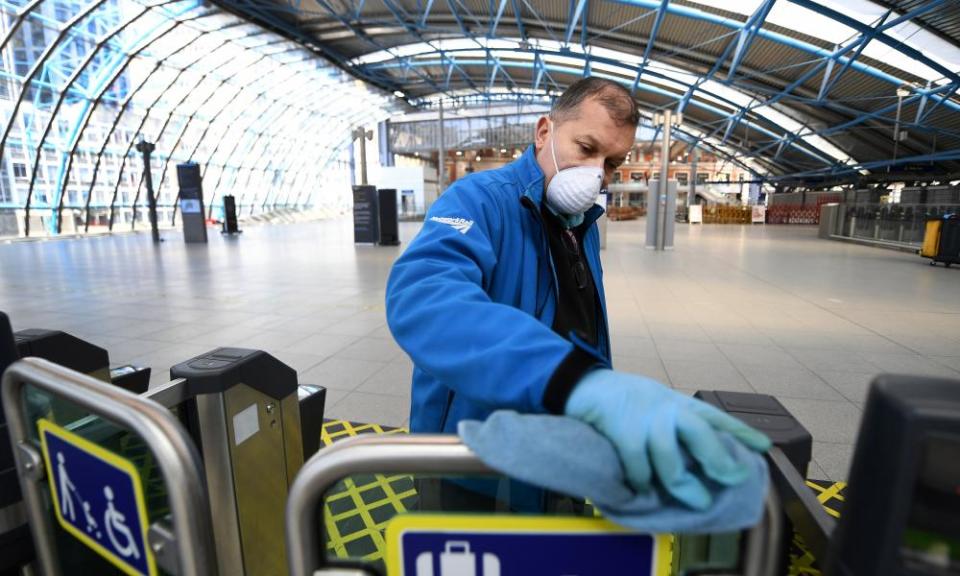What is the dispute on UK railways and could strikes be biggest in modern history?

As the biggest rail union, the National Union of Rail, Maritime and Transport Workers (RMT), ballots its members over a strike that could bring the railways to a standstill, we explain what the dispute is all about – and whether the government can stop it.
Will there definitely be strikes on the railway?
The RMT has balloted about 40,000 members across Network Rail and 16 train operating companies for industrial action over pay and cuts. Voting ends on Tuesday evening (bar in Scotland) and the results should be announced on Wednesday morning.
The RMT has to give notice, so any strikes will start in late June. All the different train firms are separate bargaining units, with Network Rail also divided into operations and maintenance. If operations – mainly signallers – vote to strike, the railway could be closed. If Aslef eventually takes drivers out, likewise. Otherwise, the immediate impact may be limited.
Related: Union threatens ‘biggest rail strike in modern UK history’
So why is the RMT considering a strike?
Pay has been frozen in much of rail since 2020, and inflation has soared. The government has told the railway to reduce costs by about 10%. Network Rail, the state-owned company that runs the infrastructure, believes it can save more than £100m a year through workplace reform. That includes changing its maintenance regime to a “risk-based” assessment and using more technology, rather than having so many boots on the ground.
While no formal proposals have been tabled, unions believe train operating companies will close ticket offices, and pay offers will be far below inflation. They say staff who were lauded as essential frontline workers during the pandemic should not now lose jobs or take effective pay cuts.
Why are cuts needed?
Rail finances have been upended by the pandemic and the government is now on the hook for the losses. Pre-2020, the industry took about £4bn in annual taxpayer subsidy; the Treasury has stumped up about £15bn more in total since Covid hit. Passenger numbers are back up to 80% of pre-Covid levels, but in key areas – the lucrative commuter networks into London, which used to bring guaranteed season ticket revenues – they are significantly lower.

Is that the new normal?
Who knows? Arguably cutting services will accelerate decline. But subsidising trains at such cost appears untenable. Even pre-pandemic, a dip in season ticket sales suggested that the commuting of yesteryear could wane. Widespread remote and part-time working has posed a great challenge: given high peak fares, occasional rail travel can seem more prohibitive than the spread cost of annual season tickets.
What is the government planning to do?
Despite Treasury cuts, generally Downing Street has been avoiding a fight. But the transport secretary, Grant Shapps, suggested that laws could be brought in to ensure “minimum service levels”, as floated in the Conservative manifesto. Such an incendiary move – effectively denying the right to strike – is unlikely to become reality, and in the short term has rallied wider union opposition.
Are other rail unions on strike?
Aslef, which is currently in dispute with ScotRail but not elsewhere in the UK, has warned it will not tolerate a further pay freeze for the train drivers it represents. The TSSA has said it is considering a ballot. But only the RMT has gone ahead yet, in a move that the rail industry has called premature.

Are rail staff well paid?
Yes, many are well paid by national standards – but most station or maintenance staff don’t earn anything like the train drivers whose salaries are often quoted in the press. Drivers (normally represented by Aslef) can earn about £63,000 on the tube and more on the national railway, where they have prospered since privatisation – largely because of the fragmented marketplace it produced for their labour.
The real gravy is in the eye-watering salaries paid to senior staff on rail projects such as HS2, while train company managers can earn far more than the prime minister – and even the Department for Transport’s rail passenger services director gets paid a salary that far outstrips most civil servants above him.
So will the rail strikes really be the biggest in modern history?
Technically, perhaps – at least if you define modern as post-Thatcher. A national signallers’ strike stopped trains intermittently across the country in 1994, and other national stoppages did occur under British Rail – but since privatisation and more draconian labour laws, disputes have largely been regional. The sheer numbers and geographic spread, with so many firms and Network Rail involved, mean it is big.
Factor in parallel strikes about pay and job cuts on the London Underground, and there could be significant disruption at times across Britain this year. But with so many more people able to work flexibly or from home, it may not quite hit commuters in the same way that, say, the Southern rail strikes of 2016-17 did.
Will it empty shelves?
Doubtful – though it might provide political cover for supply chain disruption already seen since Covid and Brexit. Only a prolonged single stoppage would halt freight. Contingency plans, with supervisors and managers drafted in, would allow some trains to run at times in the day.

 Yahoo Finance
Yahoo Finance 